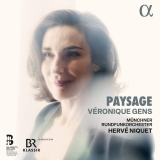Camille Saint-Saëns schrieb 1876 an die Komponistin Marie Jaëll: « Wenn Sie Lust auf ein Orchester für Ihr Lied haben, genieren Sie sich nicht, das Lied mit Orchester ist eine soziale Notwendigkeit; wenn es ein Orchester gäbe, würde man in den Konzerten nicht immer Opernmelodien singen, die dort oft eine erbärmliche Figur machen ». Dennoch denken wir heute, abgesehen von einigen Ausnahmen, beim französischen Lied eher an solche mit Klavierbegleitung. Umso begrüßenswerter ist dieses Album, das nur orchestrierte Melodien enthält, und zwar, wie Bru Zane festhält, solche der beiden Schulen, « die der ‘Miniaturisten’ mit sparsamer Orchestrierung (Massenet, Dubois, Saint-Saëns…) und die der Symphoniker mit klangvollen Ambitionen (Duparc, Jaëll, Lili Boulanger…). »Entsprechend abwechslungsreich ist das Programm, das Hervé Niquet und das Münchner Rundfunkorchester symphonisch mit Raffinement und Ausdruck bedienen.
Die reife, sensuelle Stimme von Véronique Gens glänzt wie ein Rubin, oft dunkel schimmernd, aber auch hell leuchtend, mit intensiven Nuancen und jener Wärme, die ein Markenzeichen ihres Gesangs ist. Darstellerisch ist sie immer nahe am geschrieben Wort, bevorzugt aber Verhaltenheit und Noblesse, verinnerlichte Leidenschaft und vermeidet entsprechend eine extrovertierte Dramatik, die in diesem Repertoire nur schaden würde. Wie sehr ihr interpretatorischer Ansatz sich lohnt, zeigen Vergleiche von der Saint-Saëns-Melodie Aimons-nous mit der viel direkteren Sandrine Piau oder dem zupackenderen Yann Beuron. Die Poesie des französischen Romantikers Théodor de Banville ist bei Véronique Gens am besten aufgehoben. Und so lauscht man denn auch das ganze Album hindurch eher andächtig bewegt als erregt begeistert….
Camille Saint-Saëns wrote to the composer Marie Jaëll in 1876: « If you fancy an orchestra for your song, do not be embarrassed, the song with orchestra is a social necessity; if there were an orchestra, one would not always sing opera melodies in concerts, which often cut a pitiful figure there. » Nevertheless, today, with a few exceptions, we tend to think of French songs with piano accompaniment. This makes this album all the more welcome. It contains only orchestrated melodies and, as Bru Zane states those of two schools, « that of the ‘miniaturists’ with sparse orchestration (Massenet, Dubois, Saint-Saëns…) and that of the symphonists with sonorous ambitions (Duparc, Jaëll, Lili Boulanger…) ».
The program, which Hervé Niquet and the Munich Radio Orchestra serve with symphonic refinement and expression, is correspondingly varied.
Véronique Gens’ mature, sensual voice shines like a ruby, often shimmering darkly, but also brightly, with intense nuances and the warmth that is a trademark of her singing. Her interpretation is always close to the written word, but she prefers restraint and nobility, internalized passion, avoiding extroverted drama, which would only be detrimental in this repertoire. Comparisons of the Saint-Saëns melody Aimons-nous with the much more direct Sandrine Piau or the more gripping Yann Beuron show how rewarding her interpretive approach is. The poetry of the French Romantic composer Théodor de Banville is at its best with Véronique Gens. And so, throughout the album, one listens with devotion rather than excitement….






















